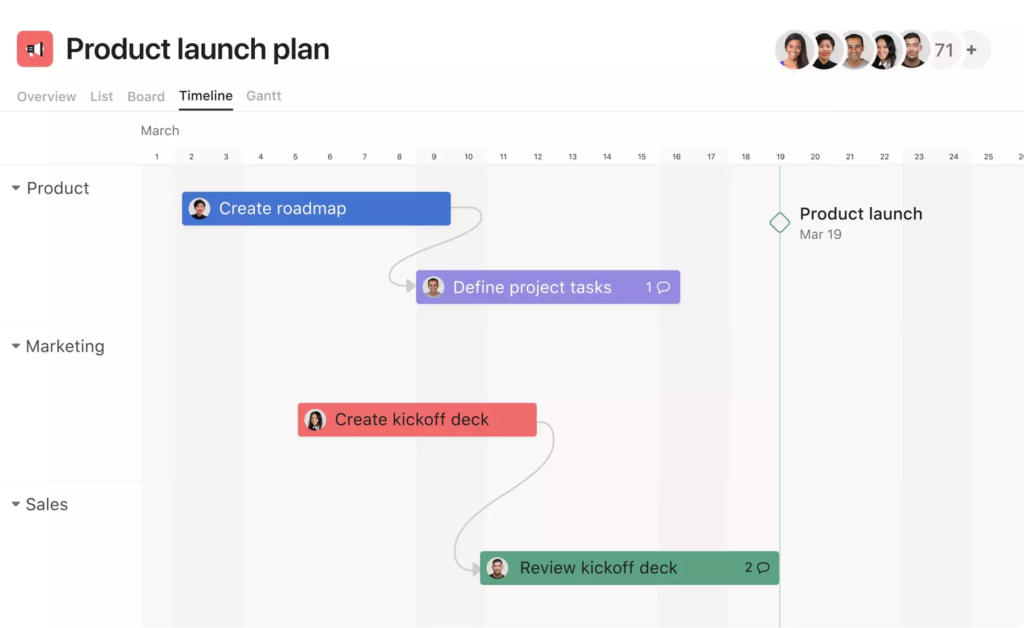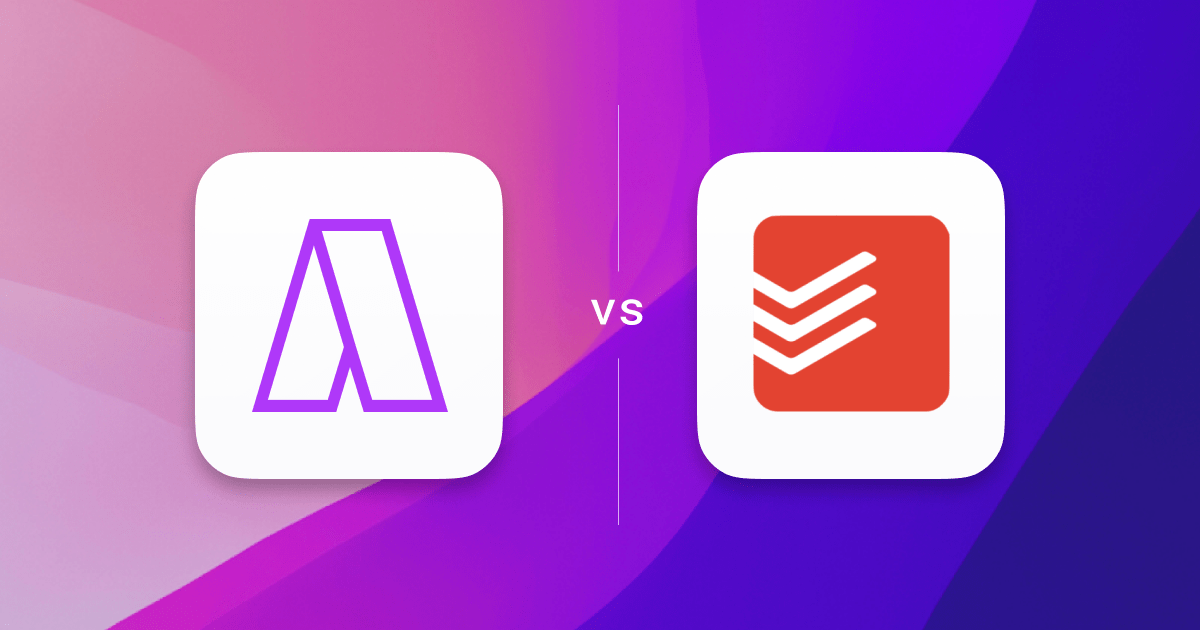What is Asana
Asana stands out as a versatile project management tool, ideal for various team sizes. Its user-friendly interface, coupled with diverse features like task management, project visualization (including Kanban and Gantt charts), and robust team collaboration tools, makes it a top choice. Additionally, Asana’s integration capabilities with other apps enhance workflow efficiency. Offering a range of pricing plans, including a free version for smaller teams, Asana caters to a broad spectrum of organizational needs. It’s particularly recommended for its ease of use, extensive integrations, and comprehensive project management features.

Key Features of Asana
- Task Management: Asana excels in task management, allowing users to create, assign, and track tasks efficiently. This feature ensures that team members are always aware of their responsibilities and deadlines, promoting productivity and accountability.
- Project Visualization: With options like Kanban boards and Gantt charts, Asana offers versatile visualization tools. These features aid in understanding the project flow and milestones, making it easier to manage timelines and resources.
- Team Collaboration: Asana fosters seamless team collaboration. It allows for easy communication within tasks, sharing of files, and updating progress, thus keeping everyone on the same page and enhancing teamwork.
- Integration Capabilities: The platform integrates with a wide range of other applications and tools, streamlining workflows and automating processes. This integration makes it a flexible tool that can adapt to various business ecosystems.
- Customization and Reporting: Asana offers extensive customization options, including custom fields and reporting features. These allow teams to tailor their project management experience and generate insightful reports for better decision-making.
- User-Friendly Interface: The intuitive interface of Asana is designed for ease of use, making it accessible for teams regardless of their technical expertise. This simplicity ensures a smooth onboarding process and enhances overall user experience.
What is Sunsama
Sunsama is a distinctive task and calendar management tool that stands out for its holistic approach to planning and productivity. Designed for professionals and teams, it combines the elements of a daily planner, task manager, and calendar into one integrated platform. Sunsama’s unique feature is its ability to help users plan their day by dragging tasks into a daily schedule, encouraging a more mindful and intentional approach to work. This integration of tasks with calendar events allows for a clear visualization of the day ahead, fostering better time management and focus. Sunsama’s emphasis on daily planning and reflection makes it particularly appealing for those who seek a more structured and balanced approach to their professional life.
Key Features of Sunsama
- Task Dashboard: Consolidates tasks from various apps like ClickUp, Notion, and Gmail into one view, reducing the need to switch contexts frequently.
- Guided Planning & Hand Holding: This feature assists in planning by helping refine tasks, align them with weekly objectives, and prevent overloading of the to-do list.
- Focus Mode & Meeting Notes: Offers a clean design and functionality for focused work, including a timer and space for making notes during meetings.
- Integration with Multiple Tools: Sunsama can connect with tools like Todoist, Trello, Asana, ClickUp, Notion, Jira, GitHub, Gmail, Outlook, and Slack.
- Efficient Task Management: The app allows effective management of tasks with features like time-blocking and linking back to the original task for completion tracking.
- User-Friendly Interface: The app’s design emphasizes ease of use and minimalism, contributing to a more mindful and focused task management experience.
Asana vs Sunsama: Features
| Features | Asana | Sunsama |
|---|---|---|
| Integrations | Google Drive, Slack, Zoho Cliq, Zapier, Jira, Zoom, Toggl Track, Loom, Harvest, Gmail | Includes Zoom, Notion, Jira, ClickUp, Trello, Asana, Todoist, Outlook, Gmail, Github, and Slack. |
| Calendar | Yes | Offers various calendar views including day, three days, weekdays, week, and month views. |
| Platforms | macOS, iOS, Android, Web, and Windows | Available as a desktop app, mobile app (iOS and Android), and web app. |
| Task Management | Task creation and assignment, due date setting, progress tracking, project organization, tagging, comments, file attachments, task conversations | Features task types like normal daily tasks, objectives, and a backlog. Offers detailed task options such as notes, start and due dates, recurring tasks, and more. |
| Natural Language Processing | Yes | No |
| Time Blocking | No | Available |
| Analytics | Yes | Provides weekly workload analytics based on completed tasks. |
| Meeting Scheduler | No | Yes |
| Time Zones | Yes | Yes |
| Reminders | Yes | Yes |
| Customer Support | Average | Average |
| 1:1 User Onboarding | Asana offers customer success services including tailored training and consultation, which might include onboarding calls for new users, especially in enterprise plans | No |
| Pricing | Asana offers three plans: the free Personal plan for basic needs, the Starter plan at $11.59 for expanded features like timeline view, and the Advanced plan at $25.69 for comprehensive project management tools including time tracking and advanced customization. | $16 per month, annually. |
Asana vs Sunsama: Pricing
Asana Pricing
Asana offers three main pricing tiers:
(i) Personal: This is a free plan, suitable for small teams or individuals. It includes basic project and task management features and supports collaboration with up to 10 team members. Users have access to unlimited tasks, projects, messages, and file storage.
(ii) Starter: Priced at $11.59 per user per month, this plan builds on the Personal plan. It allows collaboration with up to 500 teammates and introduces additional features like timeline and Gantt chart views, along with the ability to use forms and automation.
(iii) Advanced: At $25.69 per user per month, the Advanced plan includes all features from the lower tiers and adds functionalities such as goals, time tracking, proofing, approvals, and more advanced customization options.
Each tier offers a range of features to accommodate different needs, from individual use to more complex team collaboration and project management requirements.
Sunsama Pricing
Sunsama offers two main pricing plans. They have a yearly subscription priced at $16 per month, billed annually, and a monthly subscription priced at $20 per month. Additionally, they offer a 14-day free trial without requiring a credit card.
Asana vs Sunsama: Reviews
Asana Review
Asana, a popular project management tool, is praised for its intuitive interface and robust feature set, making it an excellent choice for teams of all sizes. Key strengths include versatile project views, effective task and assignment management, and smooth team collaboration. Users benefit from a variety of project views like Kanban Board, Timeline, and Gantt, alongside templates for quick project setup. Asana’s progress tracking and integration with various tools like Google Suite and Microsoft 365 further enhance its utility. However, the tool’s complexity might be overwhelming for beginners, and the cost of the Advanced package may be a concern for smaller teams or individual users.
Sunsama Review
Sunsama is a task management and daily planner tool that focuses on integrating tasks from various applications into a single dashboard. Its standout features include a user-friendly interface, guided planning, and focus mode for enhanced productivity. However, it may not be suitable for those who require more advanced project management features or extensive customization options. Additionally, the pricing might be a bit steep for individual users or small teams.
Which One Should You Pick
Consider Asana if
- You’re Managing Diverse Projects: Asana is suitable for various project types, offering flexibility with multiple view options like Kanban and Gantt charts. However, it might take time to master all the features.
- You Value Integration: Asana’s integration with many tools (like Google Suite, Microsoft 365) enhances its utility. But, be mindful that depending on external apps could complicate workflows.
- You Prioritize Team Collaboration: Asana is strong in team collaboration features, making it easy to track responsibilities and updates. Still, for very small teams or individual use, the platform might offer more than needed.
Consider Sunsama if
- You Need Integration with Existing Tools: Sunsama could be right for you if you rely on various apps for task management and seek a tool that consolidates them in one place.
- Focused Daily Planning Appeals to You: If you prefer a guided approach to daily planning, Sunsama’s features can help, although it might not be ideal for those needing in-depth project management tools.
- Minimalist Interface is Your Preference: Sunsama’s user-friendly and clean design is great for focused work, but it may not suit those looking for extensive customization options.
Best Asana and Sunsama Alternatives
- Akiflow: Akiflow is a time management app offering time blocking, task scheduling, and integrations with various tools. It focuses on productivity and organization through a unified task and appointment interface.
Akiflow Price: $19 per month, paid annually - Todoist: Todoist is a task management tool. It enables users to manage tasks, set priorities, and track deadlines across various devices. Its features include task categorization, reminders, and project collaboration, making it suitable for both personal and team productivity.
Todoist Price: Premium at $4 per month, paid annually - Trello: Trello is a visual collaboration tool for planning tasks and projects. With an intuitive interface of boards, lists, and cards, it helps teams organize work and manage projects effectively.
Trello Price: Free Plan for individuals and small teams, Standard Plan at $5 per user/month (billed annually), Premium Plan at $10 per user/month (billed annually), and an Enterprise Plan for larger organizations at $17.50 per user/month (billed annually)



